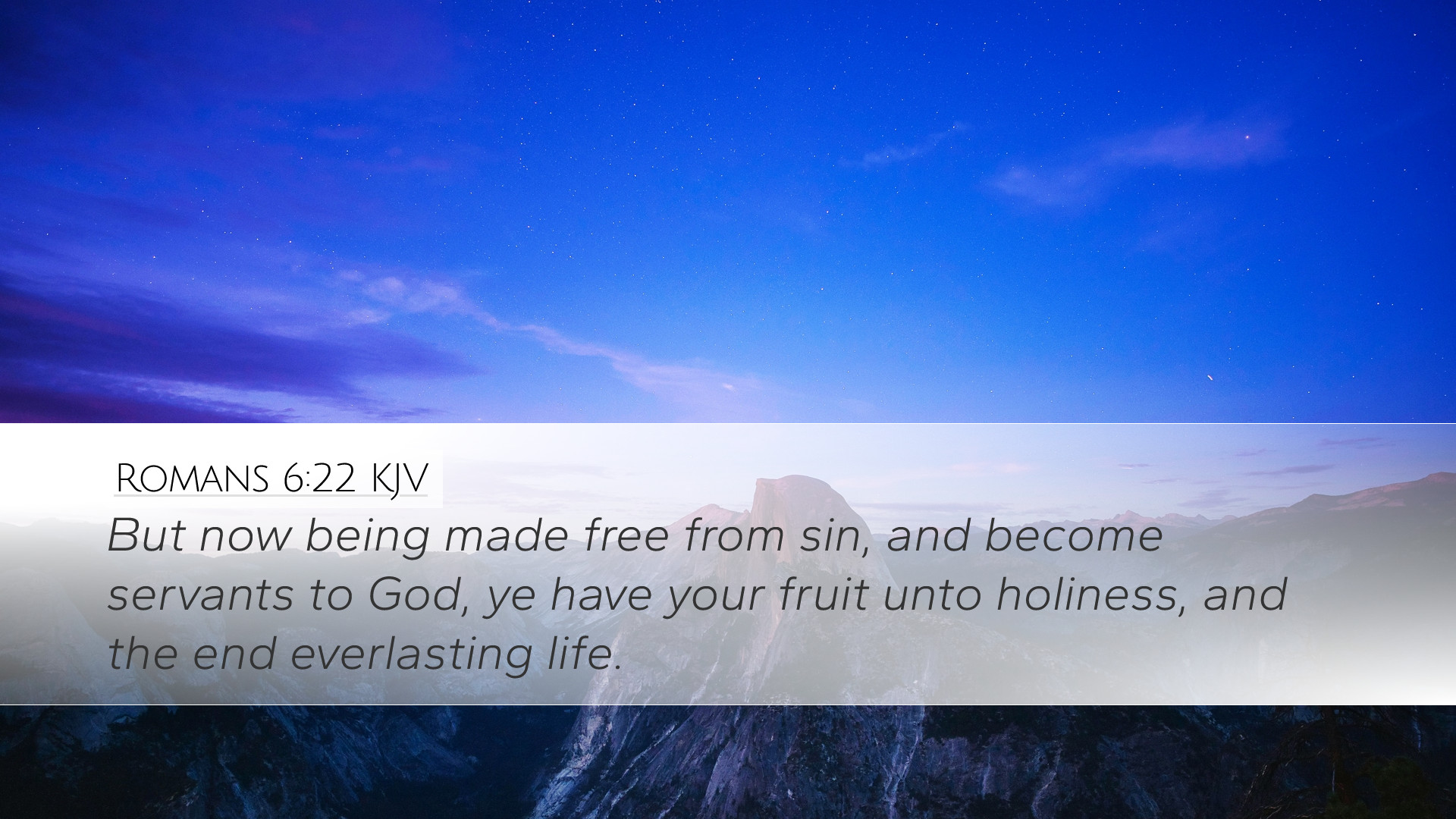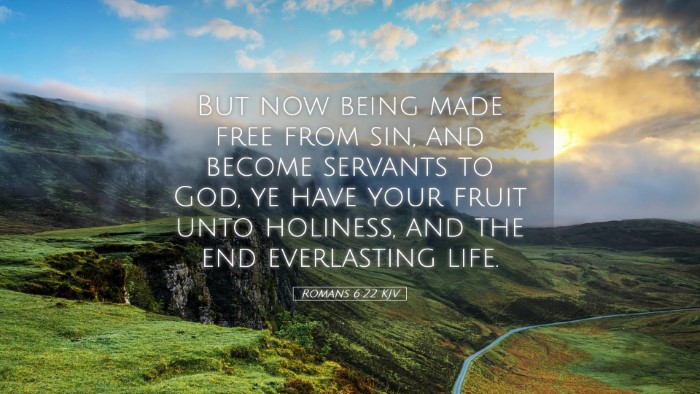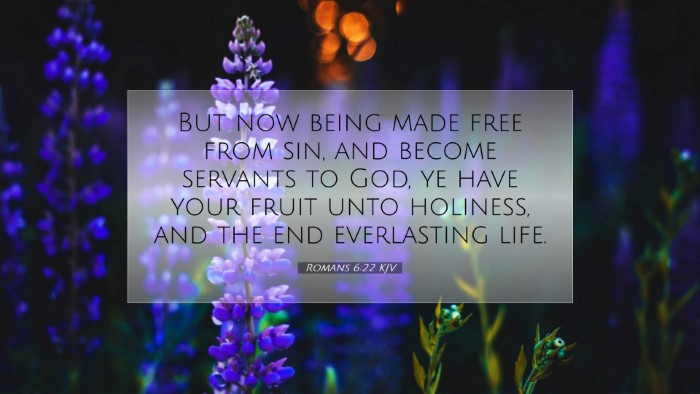Old Testament
Genesis Exodus Leviticus Numbers Deuteronomy Joshua Judges Ruth 1 Samuel 2 Samuel 1 Kings 2 Kings 1 Chronicles 2 Chronicles Ezra Nehemiah Esther Job Psalms Proverbs Ecclesiastes Song of Solomon Isaiah Jeremiah Lamentations Ezekiel Daniel Hosea Joel Amos Obadiah Jonah Micah Nahum Habakkuk Zephaniah Haggai Zechariah MalachiRomans 6:22
Romans 6:22 KJV
But now being made free from sin, and become servants to God, ye have your fruit unto holiness, and the end everlasting life.
Romans 6:22 Bible Commentary
Commentary on Romans 6:22
Verse: "But now being made free from sin, and become servants to God, ye have your fruit unto holiness, and the end everlasting life." (Romans 6:22)
Introduction
This verse serves as a pivotal moment in the Apostle Paul's epistle to the Romans. It encapsulates the transformative power of salvation and the ongoing relationship between believers and God. Paul articulates the transition from the bondage of sin to the liberation found in Christ, presenting it as a critical foundation for understanding Christian ethics and the path to eternal life.
Analysis and Commentary
Freedom from Sin
Matthew Henry emphasizes that believers are "made free from sin" through their union with Christ, which liberates them from the previous dominion of sin. This freedom is essential, as it indicates that the old self, which was a servant of sin, has been put to death, leading to a life that is no longer characterized by sin but by a vibrant relationship with God.
Albert Barnes explains that this newfound freedom is not merely an abstract legal status but a profound inner transformation. Upon accepting Christ, believers experience regeneration, which enables them to overcome sin's hold on their lives. This change is not a one-time event but an ongoing process in the life of a Christian.
Servants to God
Both Matthew Henry and Adam Clarke draw attention to the necessity of servitude, highlighting that being free from sin does not equate to autonomy from service. Instead, believers become "servants to God." This notion of servanthood reflects a profound change of allegiance—from serving sin to serving the Creator. Clarke notes that this servitude is voluntary and joyful, as it allows believers to fulfill their true purpose in life.
- Henry: Servanthood to God leads to righteousness, which is the fruit of the Spirit.
- Clarke: This servitude should be an acknowledgment of God’s sovereignty and grace.
- Barnes: The act of serving God reflects obedience that is born out of love, not fear.
Fruit Unto Holiness
The "fruit unto holiness" is a powerful metaphor used by Paul that denotes the visible results of a life transformed by God. Albert Barnes suggests that holiness is the result of living in accordance with God's will, expressing itself in the believer's actions and character. It is not a performance of rituals or adherence to the law, but rather a manifestation of a heart that is bent towards God.
Matthew Henry clarifies that this fruit does not emerge instantaneously; it is the product of the believer's growth in grace and the cultivation of a closer relationship with God. The holiness referred to in this verse is an ongoing process that requires diligence and commitment.
The End Everlasting Life
Paul concludes this verse with a powerful promise regarding the ultimate outcome of the believer's journey: "the end everlasting life." Adam Clarke interprets this as not merely a future hope but a present reality that begins in the here and now. This eternal life is characterized by a personal relationship with God, which continues beyond death into eternity.
Matthew Henry emphasizes that this assurance serves as a motivation for holiness, suggesting that understanding the eternal consequences of one's choices is crucial for a believer's spiritual growth. The hope of everlasting life is both an incentive and an anchor for believers, encouraging them to persevere in faith and obedience.
Theological Implications
The implications of Romans 6:22 reach far beyond individual salvation. Albert Barnes states that this verse presents a comprehensive view of the Christian life, integrating doctrine and ethical living. The transition from sin to righteousness encapsulated in this verse highlights the transformative nature of grace, urging believers to live as witnesses to God's power and love.
Additionally, Matthew Henry points out the communal aspect of this transformation. As individuals grow in holiness, they contribute to the purity and strength of the entire body of Christ. This collective witness serves to edify the Church and draw others to the hope found in Jesus.
Conclusion
In summary, Romans 6:22 challenges believers to embrace their identity as servants of God, bearing fruit that reflects His holiness and grace. The call to be freed from sin is accompanied by the joyful responsibility of living a life that honors God, culminating in the promise of eternal life. The insights from public domain commentaries by Matthew Henry, Albert Barnes, and Adam Clarke provide a nuanced understanding of this profound verse, encouraging pastors, students, and theologians to delve deeper into the transformative power of the Gospel.


